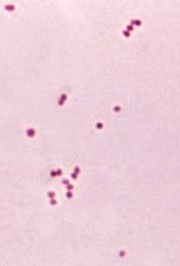Meningococcus
| Neisseria meningitidis | |
|---|---|
 |
|
| Photomicrograph of N. meningitidis | |
| Scientific classification | |
| Domain: | Bacteria |
| Phylum: | Proteobacteria |
| Class: | Betaproteobacteria |
| Order: | Neisseriales |
| Family: | Neisseriaceae |
| Genus: | Neisseria |
| Species: | N. meningitidis |
| Binomial name | |
|
Neisseria meningitidis Albrecht & Ghon 1901 |
|
Neisseria meningitidis, often referred to as meningococcus, is a Gram-negative bacterium that can cause meningitis and other forms of meningococcal disease such as meningococcemia, a life-threatening sepsis. The bacterium is referred to as a coccus because it is round, and more specifically, diplococcus because of its tendency to form pairs. About 10% of adults are carriers of the bacteria in their nasopharynx. As an exclusively human pathogen it is the main cause of bacterial meningitis in children and young adults, causing developmental impairment and death in about 10% of cases. It causes the only form of bacterial meningitis known to occur epidemically, mainly Africa and Asia. It occurs worldwide in both epidemic and endemic form.N. meningitidis is spread through saliva and respiratory secretions during coughing, sneezing, kissing, chewing on toys and even freshwater. It infects the cell by sticking to it with long thin extensions called pili and the surface-exposed proteins Opa and Opc and has several virulence factors.
Meningococcus can cause meningitis and other forms of meningococcal disease. It initially produces general symptoms like fatigue, fever, and headache and can rapidly progress to neck stiffness, coma and death in 10% of cases. Symptoms of meningococcal meningitis are easily confused with those caused by other bacteria, such as Hemophilus influenzae and . Suspicion of meningitis is a medical emergency and immediate medical assessment is recommended. Current guidance in the United Kingdom is that if a case of meningococcal meningitis or septicaemia (infection of the blood) is suspected intravenous antibiotics should be given and the ill person admitted to the hospital. This means that laboratory tests may be less likely to confirm the presence of Neisseria meningitidis as the antibiotics will dramatically lower the number of bacteria in the body. The UK guidance is based on the idea that the reduced ability to identify the bacteria is outweighed by reduced chance of death.
...
Wikipedia
